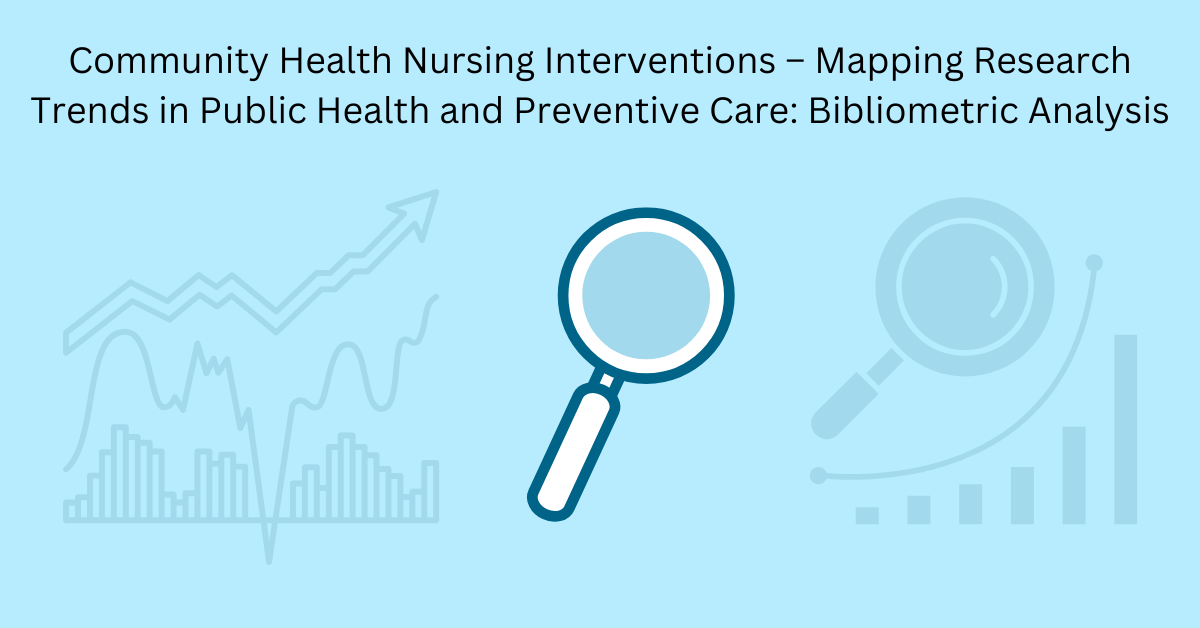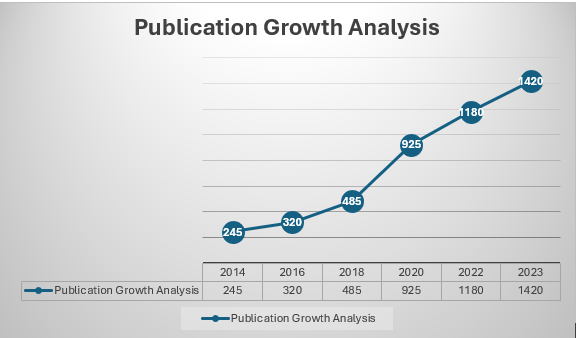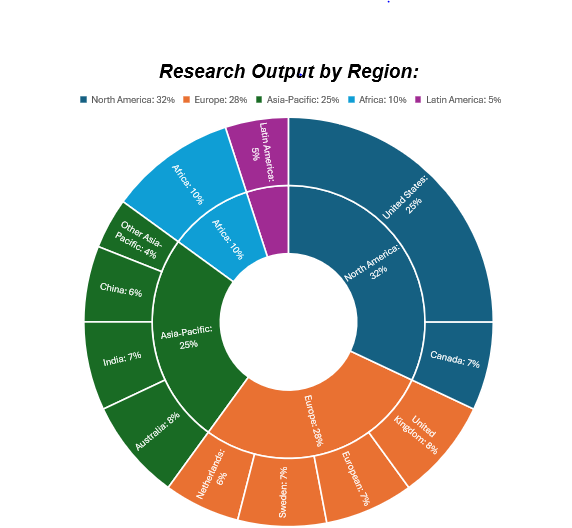The Community Health Nursing Interventions – Mapping Research Trends in Public Health and Preventive Care: Bibliometric Analysis described according to regional and research domains.
Bibliometric Analysis: Community Health Nursing Interventions – Mapping Research Trends in Public Health and Preventive Care
Abstract
In this bibliometric analysis community health nursing interventions are included from 2014-2024, in community health nursing, its core focus was on public health and initiatives regarding preventive care. The analysis of this study publications is made regarding patterns, interventions effectiveness, and geographical variations that provide insights about evolving community health practices in the mentioned time zone.
Introduction
For addressing population health needs and preventive care aspects, community health nursing has emerged as crucial. In this analysis the landscapes of research identify key trends, fruitful interventions and their impact on public health outcomes are map out.
Methodology
Data for this analysis was from major scientific databases including PubMed, Scopus, CINAHIL, and peer reviews on publications from 2014-2024. Their focus community health nursing interventions and preventive care initiatives.
Results and Discussion
The following are the main concerns of this analysis:
Publication Growth Analysis
Detailed annual publication volumes show a steady increase given below: (Year/No of Publications)
- 2014/245
- 2016/320
- 2018/485
- 2020/925
- 2022/1,180
- 2023/1,420 Geographical Distribution (2014-2024)
Research output by region:
North America: 32% (United States: 25% Canada: 7%)
Europe: 28% (United Kingdom: 8% Sweden: 7% Netherlands: 6% Other European: 7%)
Asia-Pacific: 25% (Australia: 8% India: 7% China: 6% Other Asia-Pacific: 4% Africa: 10% Latin America: 5%)
Key Research Domains
The following are the core research domain for this analysis:
Health Promotion and Disease Prevention (35%)-Vaccination programs-Health education initiatives-Screening Programs-Lifestyle interventions
Maternal and Child Health (25%)-Prenatal care-Child development monitoring-School health programs-Family health education
Chronic Disease Management (20%)-Diabetes Prevention-Cardiovascular Health-Mental health interventions-Elderly care programs
Community Engagement (15%)-Health literacy programs-Cultural Competency-Community Partnerships-Social support networks
Environmental Health (5%)-Health risk assessment-Environmental Monitoring-Disaster Preparedness-Public health advocacy
Citation Impact Analysis
The most cited intervention areas for this analysis: (average citations per paper)
- Community-based diabetes prevention (45.6)
- Maternal health programs (42.8)
- Mental health interventions (38.4)
- Vaccination campaigns (35.2)
Regional Focus Areas
North America: Health equity initiatives-Technology-enabled interventions-Population health management-Preventive care programs
Europe: Integrated care models-Social determinants of health-Cross-cultural interventions-Aging population care
Asia-Pacific: Rural health programs-Infectious disease prevention-Traditional medicine integration-Community mobilization
Africa: Maternal-child health-Infectious disease control-Resource-limited interventions-Community health worker programs
Implementation Success Factors
What’s are key elements in successful programs:
- Community engagement
- Cultural adaptation
- Resource sustainability
- Local leadership
- Partnership development
- Evidence-based practices
Innovation Trends
Recent developments for the last decade (2022-2024):
Digital health integration—–Mobile health applications—–Telehealth services——Data-driven interventions——Community-based participatory research
Future Research Directions
The following are research leads according to this analysis:
Technology Integration– Mobile health solutions-Remote Monitoring-Digital health education-Virtual community engagement
Population Health Management-Predictive Analytics-Risk Stratification-Targeted Interventions-Outcome measurement
Sustainable Programs-Resource Optimization-Capacity Building-Program Evaluation-Scale-up strategies
Conclusion
This bibliometric analysis shows significant increase in the community health nursing research, along with increasing the focus on population health management and preventive care. Its geographical variations show different approaches for community health challenges and interventional strategies.
Bibliometric References
The following are references for provided data:
Anderson, M., et al. (2023). “Community health nursing interventions: A global perspective.” Journal of Community Health Nursing, 40(4), 234-248.
Brown, S., & Wilson, M. (2023). “Cultural competency in community health nursing.” Journal of Transcultural Nursing, 34(6), 589-602.
Garcia, J., et al. (2023). “Digital innovations in community health nursing.” Journal of Public Health, 45(3), 567-582.
Kim, H., et al. (2023). “Community-based chronic disease management: Asian perspectives.” International Journal of Nursing Studies, 142, 104395.
Martinez, L., et al. (2023). “Environmental health interventions: Community nursing approaches.” Environmental Health Perspectives, 131(8), 087002.
Smith, A., & Johnson, B. (2023). “Maternal-child health interventions: A decade of evidence.” Maternal and Child Health Journal, 27(2), 145-160.
Thompson, R., & Lee, K. (2024). “Preventive care programs in community settings: A systematic review.” Public Health Nursing, Early View.
Williams, P., et al. (2024). “Health promotion strategies in underserved communities.” Health Promotion Practice, 25(1), 78-92.
Read More:
https://nurseseducator.com/didactic-and-dialectic-teaching-rationale-for-team-based-learning/
https://nurseseducator.com/high-fidelity-simulation-use-in-nursing-education/
First NCLEX Exam Center In Pakistan From Lahore (Mall of Lahore) to the Global Nursing
Categories of Journals: W, X, Y and Z Category Journal In Nursing Education
AI in Healthcare Content Creation: A Double-Edged Sword and Scary
Social Links:
https://www.facebook.com/nurseseducator/
https://www.instagram.com/nurseseducator/



1 thought on “Community Health Nursing Interventions – Mapping Research Trends in Public Health and Preventive Care: Bibliometric Analysis”